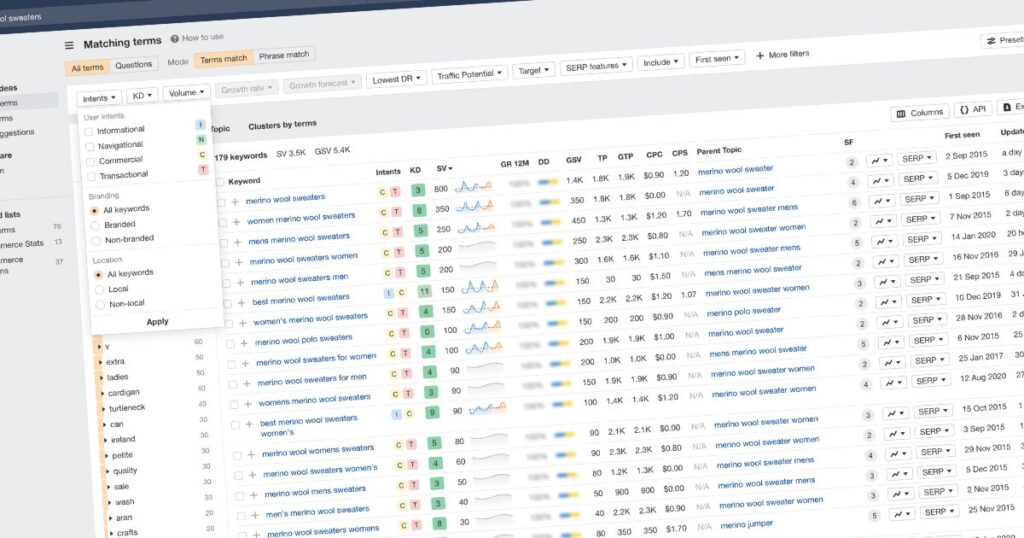Ecommerce keyword research is essential for driving relevant traffic and increasing sales. This guide will help you find great keywords and to help boost your search results for your online store.
Key Takeaways
Keyword research is essential for ecommerce success, facilitating the attraction of relevant traffic and improving visibility in search results.
Different types of keywords—short-tail, long-tail, and LSI—serve unique purposes in an ecommerce strategy, with long-tail keywords offering higher conversion potential.
Understanding search intent and regularly monitoring keyword performance are critical for effectively aligning ecommerce content with customer needs and adapting to market changes.
Table of Contents

Understanding Ecommerce Keyword Research
Keyword research is the cornerstone of any successful ecommerce SEO strategy. Identifying and targeting the right keywords allows ecommerce businesses to attract relevant traffic, improving visibility and driving sales. Search engines use complex algorithms to determine the relevance of a site’s content to specific search queries, making the selection of keywords a fundamental step in the keyword research process. Higher positions in search results are crucial, as the top three results capture over 58% of clicks, underscoring the importance of effective keyword research.
Understanding and implementing the right ecommerce keywords is not just about increasing traffic; it’s about attracting the right kind of traffic. When done correctly, keyword research can lead to improved visibility, higher search rankings, and ultimately, greater success for your ecommerce business. The journey begins with understanding the different types of keywords and their unique advantages.
Types of Keywords for Ecommerce
In the realm of ecommerce, not all keywords are created equal. The three main types of keywords you should learn, are short-tail, long-tail, and LSI keywords (Latent Semantic Indexing). Each type plays a crucial role in an effective keyword strategy, catering to different aspects of search engine optimization (SEO).
Short-tail keywords, long-tail keywords, and LSI keywords each have their unique advantages and applications in the keyword research process. Let’s delve into each type to understand their significance and how to leverage them for your ecommerce site.
Short-Tail Keywords
Short-tail keywords, also known as head keywords, are typically broad and consist of one or two words. These keywords are used by customers who are at the beginning of their search journey and are exploring general ideas. Examples include terms like ‘sneakers’, ‘women’s t-shirts’, and ‘gifts for men’.
While short-tail keywords can attract a high volume of searches, they are also highly competitive and challenging to rank for. Despite the competition, incorporating these keywords into your keyword strategy is essential for capturing a broad audience.
Long-Tail Keywords
Long-tail keywords are more specific phrases that often include three or more words. These keywords typically have lower search volumes but present higher targeting and conversion potential. For instance, ‘gifts for men under $20’ is a long-tail keyword that targets a specific audience with clear purchase intent.
The benefits of using long-tail keywords include fewer searches, less competition, and higher conversion rates. They are crucial for niche targeting and connecting user intent with relevant offerings.
LSI Keywords
LSI keywords (Latent Semantic Indexing) are phrases and terms that are semantically relevant to your primary keywords. By using LSI keywords, you can enhance the relevance and depth of your content, making it more likely to resonate with what users are searching for.
Some experts argue that while LSI keywords may not be critical for SEO, they can still offer benefits in terms of content depth and search relevance. Incorporating LSI keywords into your ecommerce strategy can help achieve better visibility and potentially higher rankings in search engines.

Search Intent in Ecommerce
Search intent, or user intent, defines the primary goal of users when they enter queries into search engines. Understanding this intent is essential for aligning your ecommerce site content with customer needs.
There are generally four categories of search intent:
Informational
Navigational
Commercial
Transactional
Recognizing the intent behind queries helps ecommerce businesses craft content that addresses specific user needs and improves conversion rates.
Product page keywords typically focus on specific products and direct sales, reflecting transactional intent. Category keywords, on the other hand, encompass broader topics and often align with informational or commercial intent. By tailoring your content to match these intents, you can enhance user experience and increase the likelihood of conversions.

Evaluating Keyword Metrics
Evaluating keywords involves analyzing several critical metrics that determine their effectiveness for SEO strategies. Key metrics include search volume, keyword difficulty, and competition level. Understanding these metrics is vital for crafting an effective keyword strategy and ensuring that your ecommerce site targets the most relevant keywords.
Tools like Google Keyword Planner and Ahrefs provide insights into these metrics, helping you make informed decisions about which keyword tool to target.
Search Volume
Search volume indicates how frequently a keyword is searched, helping gauge its popularity. High search volumes typically suggest successful keywords but also correspond to increased competition. Tools like Google Keyword Planner help estimate and analyze search volumes effectively. Choosing keywords should not focus solely on high search volume terms, as they tend to have more competition. A balanced strategy includes a mix of high and low search volume keywords to target a broader audience and niche markets.
Long-tail keywords with lower search volumes can be strategic for product pages. They also tend to face less competition. These keywords, while generating fewer searches, often have higher conversion rates due to their specificity and relevance to user intent. Incorporating such keywords into your product listings can enhance your chances of ranking higher in search engine results and attracting targeted traffic.
Keyword Difficulty
Keyword difficulty assesses the challenge of achieving a top ranking for a specific keyword on search engines. This metric, which typically ranges from 0 to 100, helps shape your strategy to target less competitive terms. Tools like Ahrefs and SEMrush are effective for determining keyword difficulty and providing insights into the competition level. A lower keyword difficulty score indicates a higher chance of ranking, especially for newer sites.
Factors influencing keyword difficulty include the number of referring domains, domain authority score, and the number of backlinks. High-volume keywords are usually associated with high competition, making it essential to balance your keyword strategy with a mix of competitive and less competitive terms.
Understanding keyword difficulty enables you to prioritize keywords that offer the best potential for ranking and driving traffic to your ecommerce site.
Competition Analysis
Analyzing keyword competition is vital for identifying opportunities and gaps in the market. The Keyword Golden Ratio (KGR) is a useful metric for finding lesser-used keywords that can improve rankings efficiently. Particularly useful for niche markets, the KGR helps target less competitive keywords, increasing the chances of ranking rapidly.
Competition analysis uncovers underserved keywords, providing a strategic advantage over competitors.

Finding the Best Keywords for Your Ecommerce Website
Discovering effective ecommerce keywords involves multiple methods, including brainstorming, competitor analysis, and using keyword research tools. Identifying target keywords is crucial for creating product pages and content centered around those keywords.
A comprehensive spreadsheet of ecommerce keywords provides insights into potential traffic and opportunities to target customers effectively. Given the competitive nature of the ecommerce industry, finding the right keywords is essential for ranking high in search results and driving sales.
Brainstorm Initial Keywords
Generating a list of potential keywords is the initial step in the keyword research process. Start by making a list of all possible keywords for each product, considering various sources like customer reviews, competitors’ websites, and keyword suggestions from tools.
Organize this list based on different sources to identify the most relevant and effective keywords for prioritization. This structured approach ensures that you cover all bases and discover keywords that truly resonate with your target audience.
Competitor Keyword Analysis
Analyzing competitors’ keyword strategies is essential to uncover potential opportunities and threats. The purpose of competitor research is to identify keywords that your competitors rank for but you do not. Tools like the Keyword Gap tool can help identify these keywords, providing insights into the competition’s keyword strategy. Analyzing competitors involves researching the keywords they target, the quantity and location of their backlinks, relevant topics they pursue, and their performance.
Filtering keywords by applying intent filters for commercial and transactional keywords can further refine your analysis. After gathering target keywords from competitors, identify missing keywords in your listings compared to competitors. This analysis reveals keyword gaps that can be exploited to enhance your own listings and improve search rankings.
Using Google Keyword Planner
Google’s keyword planner is a powerful tool for identifying relevant keywords and optimizing for audience search intent. The ‘Discover New Keywords’ feature allows you to generate a list of hundreds of keywords by entering a competitor’s name. However, a limitation of Google Keyword Planner is that it focuses on broad, competitive keywords and may provide limited out-of-the-box keyword ideas. To develop a strong list of keywords, explore all options available in the tool and use features like Autocomplete on Google and People Also Ask to enhance your research.
When creating a keyword list, assign a priority score out of 4 for each keyword to help in prioritization. This method ensures that you focus on keywords with the highest potential for driving traffic and conversions.
Combining Google Keyword Planner with other tools like Semrush Keyword Magic Tool can provide a comprehensive view of your keyword landscape.
Utilizing Keyword Research Tools
Various ecommerce keyword research tools are tailored for ecommerce, each offering unique features and functionalities. These tools help perform keyword research, streamlining the keyword research process and providing insights into search trends, competitor strategies, and keyword performance.
Utilizing these tools effectively can significantly enhance your ecommerce SEO strategy and drive organic traffic to your site. Let’s explore some of the most popular and powerful keyword research tools available.
Semrush
Semrush is an online SaaS platform that offers a range of granular keyword data and specialized tools for in-depth keyword analysis. Employing tools like Semrush can streamline the content gap analysis process by revealing content deficiencies in competitor articles.
This comprehensive keyword research tool helps ecommerce websites analyze search engine results, optimize content, and improve search rankings, making it an invaluable asset for ecommerce SEO.
Ahrefs
Ahrefs is a powerful keyword research tool that offers comprehensive keyword insights, helping users understand competitor strategies and search trends. With its advanced features, Ahrefs allows users to analyze what keywords competitors are ranking for, providing a strategic advantage.
Using Ahrefs effectively can lead to improved keyword strategies and better performance in search results, driving organic traffic to your ecommerce site.
Google Search Console
Google Search Console is a free tool provided by Google that enables users to monitor website performance and optimize keywords effectively. This tool assists in identifying opportunities for optimizing content based on keyword performance analysis.
By using Google Search Console, ecommerce businesses can track search rankings, identify relevant search terms, and make data-driven decisions to enhance their SEO strategies.
Optimizing Your Ecommerce Site with Keywords
Optimizing your ecommerce site with keywords is crucial for improving visibility and search rankings. This involves strategically incorporating relevant keywords into product pages, category pages, and blog content. Proper keyword optimization ensures that your ecommerce site is easily discoverable by search engines, driving organic traffic and boosting sales.
Let’s explore the best practices for optimizing different parts of your ecommerce site.
Product Pages Optimization
Keywords are crucial for optimizing product listings to improve ranking. Incorporate relevant keywords in the title, meta tags, body content, and subheadings to ensure that customers can find products easily.
Effective product page optimization enhances search engine rankings and drives targeted traffic.
Category Pages Optimization
Selecting the right keywords is crucial for increasing visibility in search engines for category pages. Content on category pages should be organized in a way that makes it easy for users to browse and find products while also incorporating relevant keywords.
Implementing SEO best practices such as optimizing meta descriptions, incorporating internal links, and using alt tags for images can significantly improve the performance of category pages.
Blog Content Optimization
Incorporating keywords naturally within headings and subheadings is essential for effective blog optimization. Using relevant keywords enhances search engine optimization and drives organic traffic. This approach ensures that blog content is discoverable and resonates with what users are searching for, ultimately boosting the site’s visibility and engagement.
Monitoring and Adjusting Your Keyword Strategy
Monitoring keyword performance is essential for assessing SEO success and justifying marketing investments. Regularly tracking keyword rankings helps businesses quickly respond to changes in algorithms and market behaviors. Effective keyword monitoring aids in distinguishing between temporary ranking fluctuations and long-term trends that may require strategy adjustments. Tools like BrightLocal and Semrush are recommended for tracking local and organic keyword rankings effectively.
Regular updates to keyword strategies are crucial as search trends and user behavior continuously evolve. Keeping track of keywords allows businesses to allocate marketing budgets more effectively based on performance data.
To improve keyword rankings, businesses should look for keywords not ranking on the first page and make necessary adjustments to their content and SEO strategies. This ongoing process ensures that your ecommerce site remains competitive and continues to attract relevant traffic.
Advanced Keyword Research Techniques
The effectiveness of SEO strategies is largely determined by the quality of the keyword research process. Advanced techniques like the Keyword Golden Ratio and content gap analysis can significantly enhance your keyword strategies. These methods help identify underutilized keywords and uncover gaps in your content, providing opportunities to better guide customers and improve search rankings.
Let’s explore these advanced techniques in more detail.
Keyword Golden Ratio
The Keyword Golden Ratio (KGR) is an essential metric used for identifying underutilized keywords in ecommerce SEO strategies. KGR helps find keywords with less competition and significant search volume, making them valuable for ecommerce businesses. The calculation involves dividing the count of Google results that feature a keyword phrase in the title. This number is then divided by the monthly search volume.
By targeting these keywords, you can improve your chances of ranking quickly and efficiently.
Content Gap Analysis
A content gap analysis is a process to evaluate existing content and uncover gaps to improve upon. This technique helps identify easy wins and opportunities to better guide customers through your ecommerce site.
Addressing content gaps enhances keyword strategy, improves search engine rankings, and provides a more comprehensive user experience.
Leveraging AI for Keyword Research
AI tools enhance keyword research by automating data analysis and providing tailored suggestions focused on user intent. Machine learning and natural language processing in AI tools help identify high-volume keywords effectively. AI-driven keyword research tools can analyze vast datasets quickly, yielding insights that inform marketing strategies. Tools like ChatGPT can generate relevant keyword ideas by using precise prompts, aiding in the early stages of research.
Best practices for using AI tools in keyword research involve setting clear goals and validating AI suggestions with human insights. Tools like Surfer SEO offer competitor analysis to enhance keyword suggestions based on high-performing content, while Ahrefs provides a unique ‘Clicks’ metric to estimate the potential traffic from specific keywords.
Leveraging AI helps stay ahead of trends and optimizes keyword strategies for maximum impact.
Summary
In conclusion, effective keyword research is the backbone of a successful ecommerce SEO strategy. By understanding different types of keywords, evaluating key metrics, and leveraging advanced techniques and AI tools, you can significantly improve your ecommerce site’s visibility and drive relevant traffic. Continuous monitoring and adjustment of your keyword strategy ensure that you stay ahead of the competition and meet the evolving needs of your customers. Embrace these strategies and watch your ecommerce business thrive in 2025 and beyond.
Frequently Asked Questions
How do I find good research keywords?
To find good research keywords, extract single words or short phrases relevant to your topic, experiment with synonyms, and consider related terms that encapsulate the essence of your subject matter. This structured approach will enhance the effectiveness of your research.
Does SEO work for ecommerce?
SEO is highly effective for e-commerce websites, as it can enhance search engine rankings, leading to increased traffic and conversions. Implementing best practices such as optimizing product pages and utilizing long-tail keywords is essential for success.
What are the keywords for ecommerce?
The key eCommerce keywords include “ecommerce,” “ecommerce website,” “DHL ecommerce tracking,” and “ecommerce platforms.” Focusing on these terms can enhance your visibility and effectiveness in the eCommerce space.
How do I find good research keywords?
To find good research keywords, extract single words or short phrases relevant to your topic, experiment with synonyms, and consider related terms that encapsulate the essence of your subject matter. This structured approach will enhance the effectiveness of your research.
Does SEO work for ecommerce?
SEO is highly effective for e-commerce websites, as it can enhance search engine rankings, leading to increased traffic and conversions. Implementing best practices such as optimizing product pages and utilizing long-tail keywords is essential for success.
What are the keywords for ecommerce?
The key eCommerce keywords include “ecommerce,” “ecommerce website,” “DHL ecommerce tracking,” and “ecommerce platforms.” Focusing on these terms can enhance your visibility and effectiveness in the eCommerce space.
Why is search intent important in ecommerce keyword research?
Search intent is crucial in ecommerce keyword research because it ensures that your site’s content meets customer needs, ultimately enhancing conversion rates. By aligning your offerings with user goals, you can attract more relevant traffic and drive sales effectively.
How can I evaluate the effectiveness of a keyword?
To effectively evaluate a keyword, analyze metrics such as search volume, keyword difficulty, and competition level using tools like Google Keyword Planner and Ahrefs. This will provide you with valuable insights into the keyword’s potential effectiveness.

